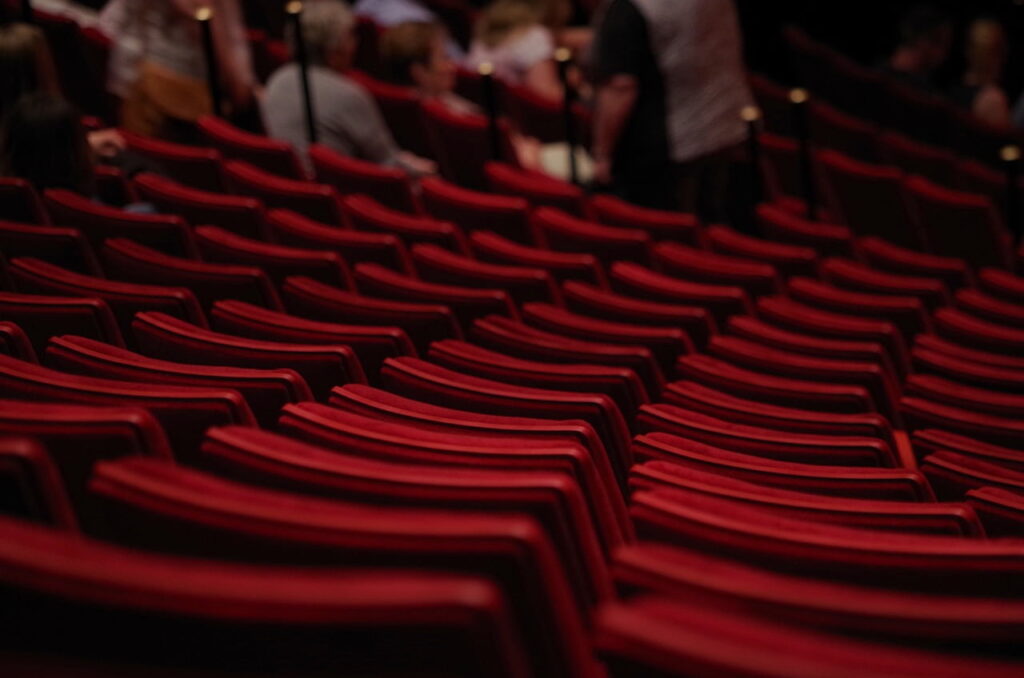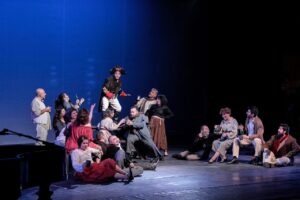Writing a Theatre Studies Extended Essay for the IB Diploma can be exciting and difficult. From my experience, students who follow a clear plan usually write interesting essays that meet the IB evaluation standards well. Critical thinking, historical background, and performance evaluation are all necessary for Theatre Studies, unlike other IB classes. If you are feeling swamped, don’t worry—this guide will walk you through how to write a Theatre Studies Extended Essay.
To write a good Theatre Studies Extended Essay, you need a straightforward research question, organized research, and strong arguments. This applies whether you are looking at a play, a writer, or changes in theatre over time. Let’s take it one step at a time.
What Is the Theatre Studies EE?
To set the stage for what follows, let’s define a Theatre Studies EE. Students may use this 4,000-word independent research paper to research a particular facet of theatre.
What is required for the Theatre Studies EE goes beyond what is often expected of essays in this field, such as providing broad synopses of plays or analyses of performances. Instead, the IB program encourages students to conduct in-depth analysis using academic sources, real-world examples, and theoretical frameworks. Evaluation, interpretation, and the development of persuasive arguments on a particular facet of theatre should be the main goals.
In addition, wherever feasible, students should use primary sources in their research. You may, for instance, go back on your own performance experiences or conduct interviews with theatre professionals if you were to analyze acting approaches. This approach shows a solid grasp of theatre as an academic field and a practical art form, which helps develop a better and more unique essay.
Features of a well-written extended essay for the IB Theatre Studies program include:
- A well-defined research question that permits thorough examination.
- An argument with a framework supported by credible scholarly sources and examples.
- An apparent link between theoretical frameworks and real-world theatrical practices.
- A high level of individual investment, displaying critical thinking and evaluation skills.
Students who go headfirst into the analytical and research-based EE tend to turn in the best, most organized essays. Think of theatre as a complicated, multi-faceted topic that calls for critical analysis rather than just as an art form.
How to Choose the Right Topic?
In my opinion, picking a solid subject is only the beginning—underdeveloped ideas and superficial analysis result when students choose a general, overarching subject. The way to go is to focus on a single area and develop a well-defined research question that permits thorough investigation.

For example, the topic of “The Influence of Shakespeare on Modern Theatre” is extensive. Building a coherent argument is challenging since there are many factors to consider. “How does physicality in Shakespearean performance affect audience interpretation in contemporary productions?” provides a more focused research path and allows in-depth examination.
So, a perfect Extended Essay topic for Theatre Studies EE should:
✔️ Be specific – Avoid generalizations and focus on a particular performance style, artist, or cultural element.
✔️ Allow for analysis – Ensure enough data to analyze, not simply explain a material.
✔️ Include academic sources to back your argument – Pick a topic with some written material available.
✔️ Interest you personally – Having a personal interest in the subject will make the lengthy process of writing an EE much more bearable.
Picking the right topic makes writing easier and helps your Theatre Studies EE meet IB standards. Because their cases stay focused and well-supported throughout, students who choose well-defined, research-able questions typically perform better academically.
After choosing your topic, the next step is to organize your research well and create a solid argument. A well-structured essay explaining why your research question is important and how your results contribute to Theatre Studies will clearly guide the reader through your analysis.
You May Also Be Interested:
- Good IB Visual Arts Extended Essay Topics
- Environmental Systems and Societies Extended Essay Topics
- Geography Extended Essay Topics
- How to Write IB Extended Essay
Hot to Analyze Sources and Conduct Research for Theatre Studies EE?
I believe that good research is the key to a successful Theatre Studies EE. Without strong scholarly sources, your reasons won’t seem trustworthy, and your analysis might look shallow. Using blogs, fan groups, or opinion pieces might seem appealing, but these sources usually don’t have the academic depth and neutrality needed for an IB Extended Essay. Focus on scholarly sources that offer well-researched and peer-reviewed information.
Here are some research sources you should think about:
- Theatre journals and academic books contain peer-reviewed articles about theatre theory, performance analysis, and history.
- Performance reviews and case studies show real examples of plays. While academic books offer theoretical ideas, case studies, and reviews help us understand how these ideas work in practice.
- Scripts, play texts, interviews with theatre professionals, and live or video acts are all examples of primary sources.
- Theatre Research International and the National Theatre’s Digital Archive are great resources for theatre research.
One common mistake students make is depending too much on just one source type. To conduct a thorough analysis, it is best to mix theory writings with reviews of performances and primary research.
Analyze Theatrical Performances
A good IB Theatre Studies Extended Essay does more than just describe; it examines and explains the material. In my experience, many students make the mistake of defining a play instead of analyzing its essential parts. Instead of saying, “This play was about…”, talk about how different theater parts work together to create meaning and effect.
When looking at results, keep these critical points in mind:
- Movement and gesture – How do artists express ideas without words using their bodies and actions? In physical theatre, players often use movement instead of words, expressing themselves only through body language.
- Lighting and set design – How do these aspects improve the feeling, ideas, and symbols in a performance? In expressionist theatre, bright lights, and unusual sets are often used to show how characters feel.
- Directorial choices – Directors have different ways of seeing and understanding a show. How does their perspective influence how the audience views the story? Do they use regular or new types of staging? Are they sticking to what the author wanted or changing it to fit today’s audience?
To improve your analysis, include specific examples. For instance, if your EE is about Brechtian techniques in modern theatre, don’t just describe his theories—apply them. Look at how a regular show is produced versus one inspired by Brecht. Discuss whether the director made the audience feel detached from the story (called “Verfremdungseffekt”).
Crush your IB goals with our extended essay writing service!
Leave the stress to our expert writers and enjoy some downtime. Excellence is just a click away.

An example of the proper format for an analysis may be seen here:
❌ Weak Analysis
“The director used few props and interacted directly with the audience, which aligns with Brecht’s style.”
✅ Stronger Analysis
“The director employed Brechtian alienation methods by using a minimalist stage and having performers immediately engage with the audience, breaking the fourth wall. This interrupted emotional engagement and prompted the audience to critically contemplate the play’s topics, consistent with Brecht’s original purpose.”
Compare Live vs. Recorded Performances
Observing a performance in real time will always provide the most profound insights. Nevertheless, I acknowledge that this is not always feasible. When depending on recorded performances, ensure to critically evaluate what the recording includes in contrast to what it may omit. For instance:
- Live performances provide the immediate sensation of audience responses, a phenomenon that recordings often do not convey.
- Filmed adaptations may include close-up views emphasizing specific actor reactions while sacrificing the immersive, full-stage perspective.
A comprehensive Theatre Studies EE should examine these distinctions. When assessing a play, seek both a live performance (if accessible) and a recorded version, then evaluate the variations in features such as pace, stage design, and audience engagement.
Connect Research to Your Argument
Good research and performance analysis are essential only if they help answer your research question. Many students gather much information but find it hard to use it well in their essays. To stay focused:
- Always connect your analysis to your research question. If you’re studying Shakespeare’s gender portrayals, don’t just analyze random stage decisions; pay attention to how those decisions affect gender presentation.
- Use theatre theory to support your argument. When discussing Stanislavski’s method, mention artists who have used it in their performances. If studying epic theatre, reference Brecht’s works on Verfremdungseffekt.
- Stay on topic and think critically in your work. Instead of providing lengthy explanations, focus on how certain choices affect the meaning and how the audience understands it.
In my experience, students who regularly connect their research to their arguments usually get better grades. This is because they show they understand their topic deeply instead of just sharing facts.
Final Thoughts
Writing a Theatre Studies EE might seem tricky, but it’s easy to handle with the proper steps. In my experience, the best essays are written with enthusiasm and care. Pick a topic that interests you, use a clear plan, and analyze it thoroughly rather than merely describing it.
If you stay focused and work hard, you’ll write an impressive IB Theatre Studies Extended Essay. If you need expert help, BuyExtendedEssay.com is ready to support you. Now, it’s time to begin writing—good luck!

Valerie Green
Valerie Green is a dedicated educator who spends her time helping high school and college students succeed. She writes articles and guides for various online education projects, providing students with the tools they need to excel in their studies. Friendly and approachable, she is committed to making a difference in the lives of students.

Can You Ask Questions in an Essay?
Let’s get this out of the way immediately: can you ask questions in an essay? Yes—you absolutely can. And sometimes, you should. That said, they need to be used correctly, at the right moment, and with the right purpose.

Can Turnitin Detect Essays Bought Online?
Many students wonder: Can Turnitin detect essays bought online? The answer isn’t as simple. Turnitin does not verify authorship, but it is highly effective at detecting text similarities.

How to Avoid Plagiarism in Your Essay?
Plagiarism is a serious issue in academic writing, but avoiding it is easier than you think. In this guide, I’ll share practical IB writing tips to help you cite sources correctly, paraphrase effectively, and develop strong research habits.

What Are Interdisciplinary Topics in IB Extended Essays?
This article explains what interdisciplinary IB Extended Essays are, why they matter, and how to select the best topic. You’ll also find topic ideas and research strategies.

How to Write an Environmental Systems and Societies Extended Essay?
This guide covers everything from selecting a compelling topic to organizing your essay effectively. Learn how to balance scientific and societal perspectives, apply IB’s assessment criteria, and use expert tips to maximize your score.

How to Write a Theatre Studies Extended Essay?
In my experience, the best IB Theatre Studies Extended Essays are those that go beyond simple description—strong essays critically examine performances, directorial choices, or theoretical perspectives with depth and precision.

